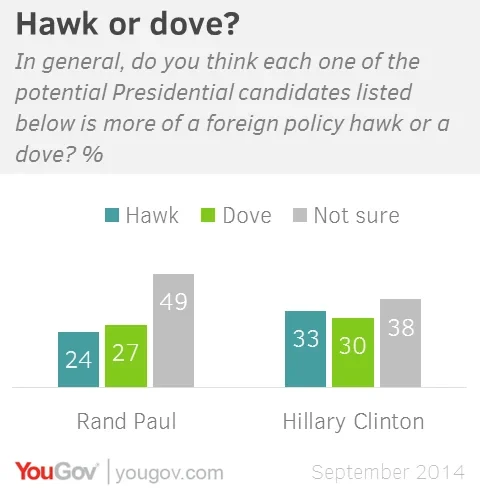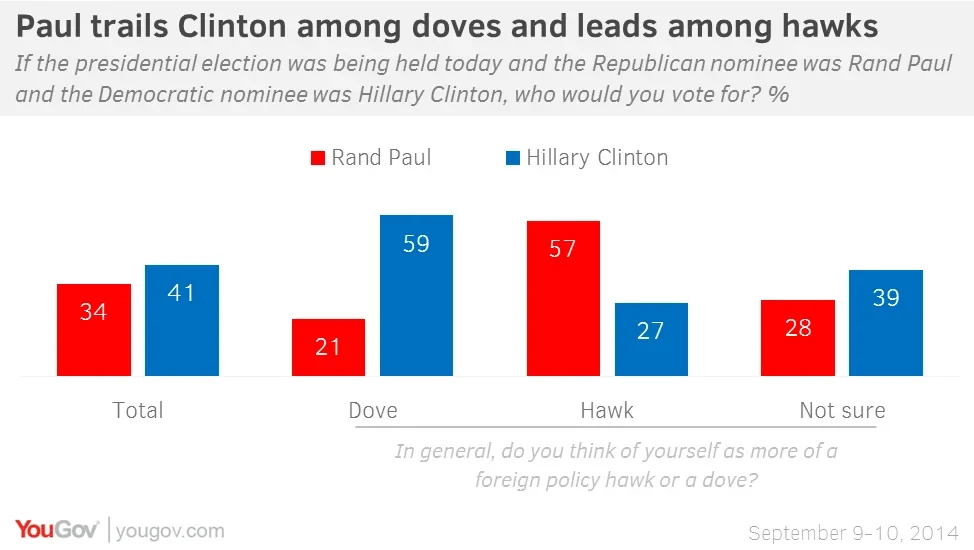More Americans see Hillary Clinton as a hawk than Rand Paul, but hawks would still opt for Paul over Clinton in a presidential match-up
On Thursday evening the Senate voted 78-22 in favor of funding a trainging program for Syrian anti-government rebels, but not before Sen. Rand Paul gave an emotional speech criticizing the policy and the "hawks" who have long pushed for greater military involvement in Syria. The speech follows calls by Paul to “destroy ISIS militarily”, and together his statements suggest the potential 2016 presidential candidate will be difficult to fit into the conventional “hawk” or “dove” label.
A new YouGov poll suggests Americans remain uncertain or divided about then bent of Rand Paul’s foreign policy views. Asked whether the senator is a foreign policy “hawk” or “dove”, half (49%) of Americans say they aren’t sure, while the rest are almost evenly divided between those that see him as a hawk (24%) or a dove (27%).

However, the same poll finds a similarly muddled picture when it comes to assessments of Hillary Clinton, with 33% calling the former Secretary of State a hawk, 30% calling her a dove, and 38% not sure. Clinton's "hawk" and "dove" numbers are both higher than Paul's (with fewer not sure), but the gap is wider on "hawk".
The lack of consensus contrasts with opinions about the last 8 elected presidents found in a July YouGov survey. Then, the public decisively viewed each individual as fitting into either the hawk or the dove category.
2016
Some commentators have said Rand Paul’s anti-interventionist views and Hillary Clinton’s hawkish reputation could turn the foreign policy dynamic of recent presidential campaigns – a Republican hawk versus a Democratic dove – on its head if Paul and Clinton become their parties' presidential nominees in 2016.
However, at this time, only 12% of Republicans would vote for Hillary Clinton over Rand Paul if the presidential election were held today, while even fewer (6%) Democrats would vote for Rand Paul. Clinton also decisively wins the support of the majority (59%) of self-described doves, while Paul wins over most hawks; an 11-point advantage over Paul among those unsure if they are hawks or doves helps give Clinton a seven-point edge overall.

The findings could mean many things – for one, that the jury is still out on the foreign policy identity of either potential candidate. But the numbers should also be viewed in light of how much weight voters even give to foreign policy when picking a president.
YouGov’s polling has found that Republicans increasingly have an appetite for a president who is “more willing” than Obama to use the US military abroad: 58% of GOP indentifiers state this preference now, compared to just 42% in May. However, few voters cite foreign policy as a top concern, even amid the recent spate of international crises in Iraq, Israel Palestine and Ukraine. In the latest Economist/YouGov poll, only 13% of Americans cited either terrorism, the war in Afghanistan or foreign policy as the most important issue for them personally, when picking from a list that also included the economy (25%) and Social Security (14%). Separately, less than half (43%) described foreign policy as “very important” to them, a lower number than is found for most other issues on the list.
Full poll results can be found here.
Image: PA









